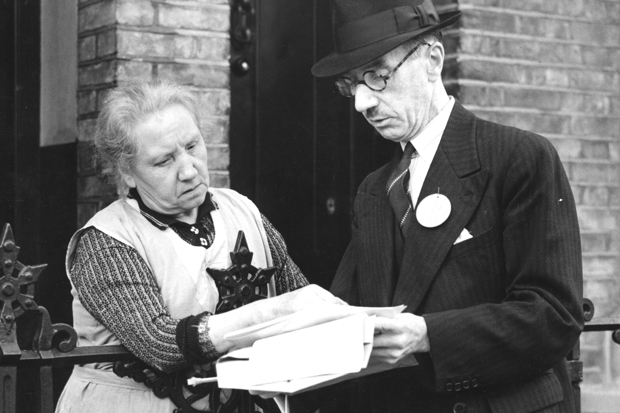Not long ago, I woke up in hospital, in pain, with a damaged back, but grateful for the sleep that a couple of doses of morphine had secured. ‘Morning,’ said a sixtysomething man who appeared by the side of the bed. ‘I’m Derek, I’m a volunteer here.’
‘Hello Derek.’
‘I’ve bought you some cornflakes.’
I wanted to hug him.
‘Also…’ He produced a sheet of paper. Oh no. ‘There are a few questions here about how you’ve found your stay with us. I can fill them in for you if you want…’
Luckily I was too weak to get angry. ‘Could you just leave it there, Derek? I might look at it later.’
You can’t go anywhere these days without being hit by a feedback form. Restaurants, shops, hotels, dentists, hospitals — no matter what service you’ve paid for, the company involved wants you to answer a series of questions on how well they provided it and how they might provide it more efficiently in the future. Even galleries ambush you with forms as you walk out. Can you measure the value of seeing a Titian on a strongly agree/strongly disagree scale?
Often, as if to acknowledge what a faff this is, the firm adds the offer of a free meal/train journey/Hawaiian massage to a winner drawn at random from all those completing the form. Well, businesses of Britain, here’s the only bit of feedback you need: if it takes an A4 sheet of moronic multiple-choice questions — or an interminable click-box online survey — for you to decide whether your customers are happy, you’re doomed.
It was very simple in the old days. A company knew if it wasn’t doing a good job — the till was empty. And for any decent outfit this is still the case. You don’t get corner shops issuing feedback forms. Or family-run restaurants, independent plumbers or local cab firms. They assess how happy their customers are by — radical concept, this — talking to them. If a newsagent gets three people asking for a particular magazine, he thinks, ‘Hang on, might be worth my while stocking this.’ If the owner of a sandwich shop notices that a regular has stopped having the coronation chicken, she might revert to her original recipe. If a boiler engineer gets a dozen calls starting ‘a friend recommended you’, he knows he’s on the right track.
Corporate Britain, however, doesn’t work that way. Corporate Britain needs everything written down for it, then itemised and analysed. Only when it has systematically collated the answers from all the feedback forms and compiled a report (or, as any normal person would call it, ‘entirely missed the point’) can Corporate Britain rest secure.
There might conceivably be a justification for online customer satisfaction surveys — dealing with your punters over the internet prevents you seeing the whites of their eyes. But not in the real world. If you haven’t got staff with enough nous to observe what’s happening and then respond accordingly, no sequence of crosses will do the job for you.
But then so often these days that’s the problem — there aren’t any staff on the ground, or at least any who display a sense of representing the company that pays them. More and more retail and leisure encounters feel as though it’s the two of you versus the owners, a hidden global corporation that takes the profits but isn’t actually there. If you try to complain about something, the person behind the counter will sympathise but then say they can’t help because ‘company policy’ doesn’t cover these circumstances. They are just as cynical about their employer as you are, indeed they call the company ‘them’ rather than ‘us’, but essentially they’re powerless to help because the ‘system’ won’t let them. In a set-up like this, feedback forms are the nearest that business owners — or NHS senior management — get to meeting their customers.
Needless to say, I left the hospital questionnaire uncompleted. Only when there’s a ‘How could we have improved your experience?’ box am I ever tempted to respond, by writing ‘not handing me this stupid form’.
You could see Derek’s astonishment at someone refusing to play ball. Maybe that’s it — we Brits keep being given these forms because we’re too polite to ignore them. The even more cynical thought is that firms know the forms are meaningless, and only provide them to con customers into thinking, ‘Oh, look, they’re asking us whether we’re happy, therefore they must really care.’
But here’s another way to look at it, Corporate Britain: all that energy you put into writing and designing those forms — why not put it into simply being better at your job in the first place?






Comments